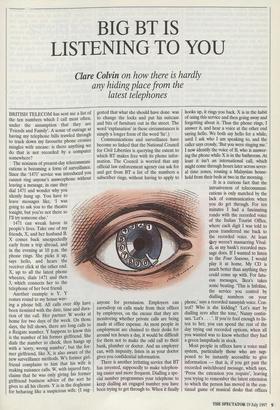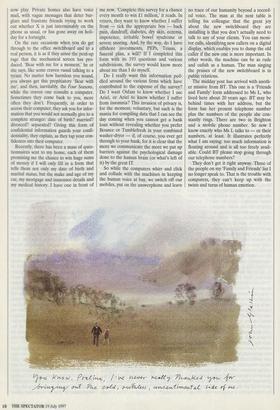BIG BT IS LISTENING TO YOU
Clare Colvin on how there is hardly any hiding place from the latest telephones BRITISH TELECOM has sent me a list of the ten numbers which I call most often, under the assumption that they are `Friends and Family'. A sense of outrage at having my telephone bills trawled through to track down my favourite phone cronies mingles with unease: is there anything we do that is not recorded by a computer somewhere?
1471 can wreak havoc in people's lives. Take one of my friends, X, and her husband B. X comes back unexpectedly early from a trip abroad, and in the evening at 10 p.m. the phone rings. She picks it up, says hello, and hears the receiver click at the other end. X, up to all the latest phone wheezes, dials 1471 and then 3, which connects her to the telephone of her best friend.
Another example is Y. Y comes round to my house wav- ing a phone bill. All calls over 40p have been itemised with the date, time and dura- tion of the call. Her partner W works at home for two days of the week. On those days, the bill shows, there are long calls to a Reigate number. Y happens to know this is the number of his former girlfriend. She dials the number to check, then hangs up with a 'sorry, wrong number', but the for- mer girlfriend, like X, is also aware of the new surveillance methods. W's former girl- friend complains to him that his wife is making nuisance calls. W, with injured fury, claims that he was only giving his former girlfriend business advice of the sort he gives to all his clients. Y is in the doghouse for behaving like a suspicious wife. (I sug- gested that what she should have done was to change the locks and put his suitcase and bits of furniture out in the street. The word 'explanation' in these circumstances is simply a longer form of the word 'lie') Communications and surveillance have become so linked that the National Council for Civil Liberties is querying the extent to which BT makes free with its phone infor- mation. The Council is worried that any official law enforcement agency can ask for and get from BT a list of the numbers a subscriber rings, without having to apply to anyone for permission. Employers can eavesdrop on calls made from their offices by employees, on the excuse that they are monitoring whether private calls are being made at office expense. As most people in employment are chained to their desks for around ten hours a day, it would be difficult for them not to make the odd call to their bank, plumber or doctor. And an employer can, with impunity, listen in as your doctor gives you confidential information.
There is another irritating service that BT has invented, supposedly to make telephon- ing easier and more frequent. Dialling a spe- cial number programmes your telephone to keep dialling an engaged number you have been trying to get through to. When it finally hooks up, it rings you back. X is in the habit of using this service and then going away and forgetting about it. Thus the phone rings, I answer it, and hear a voice at the other end saying hello. We both say hello for a while, until I ask who I am speaking to, and the caller says crossly, 'But you were ringing me.' I now identify the voice of B, who is answer- ing the phone while X is in the bathroom. At least it isn't an international call, which might come through hours later across sever- al time zones, rousing a Malaysian house- hold from their beds at two in the morning. It is a curious fact that the intrusiveness of telecommuni- cations is only matched by the lack of communication when you do get through. For ten minutes I had a fascinating rondo with the recorded voice of the Italian Tourist Office, where each digit I was told to press transferred me back to the recorded voice. At least they weren't massacring Vival- di, as my bank's recorded mes- sage does. If I wanted to listen to the Four Seasons, I would play it at home. My CD is much better than anything they could come up with. For fatu- ous messages, Ikea's takes some beating. 'This is Infoline, the service you control by dialling numbers on your phone,' says a recorded nannyish voice. Con- trol? Who is she kidding? 'Let's start by dialling zero after the tone,' Nanny contin- ues. 'Let's . . . If you're fool enough to lis- ten to her, you can spend the rest of the day trying out recorded options, when all you wanted was to know whether they had a green lampshade in stock.
Most people in offices have a voice mail system, particularly those who are sup- posed to be instantly accessible to give information — that is, if you get past the recorded switchboard message, which says, `Press the extension you require', leaving you trying to remember the latest extension to which the person has moved in the con- tinual game of musical desks that offices now play. Private homes also have voice mail, with vague messages that deter bur- glars and frustrate friends trying to work out whether X is just interminably on the phone as usual, or has gone away on holi- day for a fortnight. On the rare occasions when you do get through to the office switchboard and to a real person, it is as if they sense the pent-up rage that the mechanical screen has pro- duced. 'Bear with me for a moment,' he or she says, like some craven vassal talking to a tyrant. No matter how harmless you sound, you always get this propitiatory 'Bear with me', and then, inevitably, the Four Seasons, while the craven one consults a computer. Sometimes they come back to you, more often they don't. Frequently, in order to access their computer, they ask you for infor- mation that you would not normally give to a complete stranger: date of birth? married? divorced? separated? Giving this form of confidential information guards your confi- dentiality, they explain, as they tap your con- fidences into their computer. Recently, there has been a mass of ques- tionnaires sent to my home, each of them promising me the chance to win huge sums of money if I will only fill in a form that tells them not only my date of birth and marital status, but the make and age of my car, my mortgage and insurance details and my medical history. I have one in front of me now. 'Complete this survey for a chance every month to win million,' it reads. In return, they want to know whether I suffer from — tick the appropriate box — back pain, dandruff, diabetes, dry skin, eczema, impotence, irritable bowel syndrome or severe snoring. And, by the way, do I have offshore investments, PEPs, Tessas, a funeral plan, a will? If I completed this form with its 193 questions and various subdivisions, the survey would know more about me than I do myself. Do I really want this information ped- dled around the various firms which have contributed to the expense of the survey? Do I want Oxfam to know whether I use Ariel, or Ariel to know whether I suffer from insomnia? This invasion of privacy is, for the moment, voluntary, but such is the mania for compiling data that I can see the day coming when you cannot get a bank loan without revealing whether you prefer Bounce or Tumblefresh in your combined washer-dryer — if, of course, you ever get through to your bank, for it is clear that the more we communicate the more we put up barriers against the psychological damage done to the human brain (or what's left of it) by the great IT. So while the computers whirr and click and collude with the machines in keeping the human voice at bay, we switch off our mobiles, put on the answerphone and leave notrace of our humanity beyond a record- ed voice. The man at the next table is telling his colleague that the great joy about the new switchboard they are installing is that you don't actually need to talk to any of your clients. You can moni- tor calls, identifying new callers on a digital display, which enables you to dump the old caller if the new one is more important. In other words, the machine can be as rude and oafish as a human. The man singing the praises of the new switchboard is in public The midday post has arrived with anoth- er missive from BT. This one is a 'Friends and Family' form addressed to Ms L, who lived here about 20 years ago. BT may be behind times with her address, but the form has her present telephone number plus the numbers of the people she con- stantly rings. There are two in Brighton and a mobile phone number. So now I know exactly who Ms L talks to — or their numbers, at least. It illustrates perfectly what I am saying: too much information is floating around and is all too freely avail- able. Could BT please stop going through our telephone numbers? They don't get it right anyway. Three of the people on my 'Family and Friends' list I no longer speak to. That is the trouble with computers, they can't keep up with the twists and turns of human emotion.



























































 Previous page
Previous page